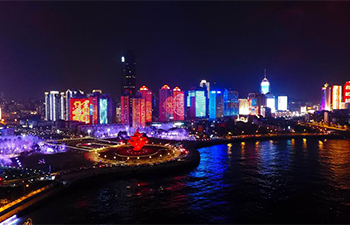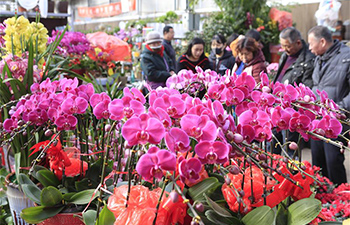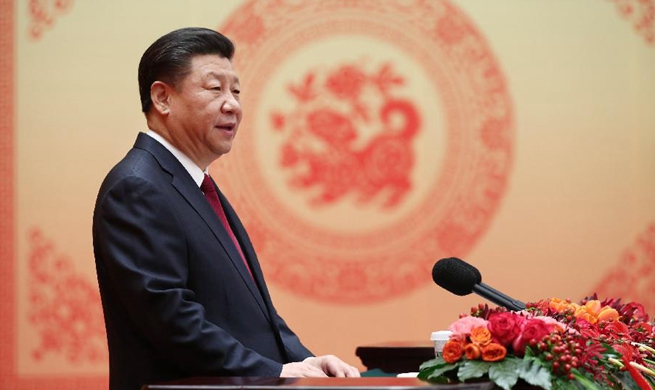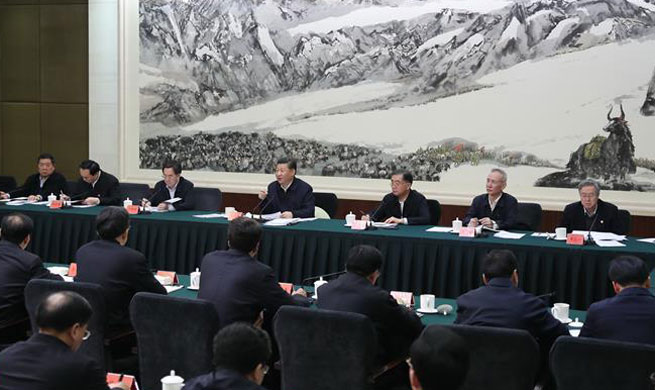By Maria Vasileiou
THE HAGUE, Feb. 14 (Xinhua) -- Milan's legal appeal to annul a European Union (EU) decision to move the European Medicines Agency (EMA) from London to Amsterdam after Brexit highlights how important it is for EU member states to host the bloc's organizations in their own territory.
Accommodating an EU agency or institution has both symbolic and economic value to the host country, said Thomas Christiansen, Chair in European Institutional Politics at Maastricht University.
"It has a political value as the countries involved can demonstrate to their people that they have been successful in pursue of their goals in playing a more prominent role within Europe," Christiansen said.
Amsterdam's win to host the EMA was hailed by Dutch Prime Minister Mark Rutte as "a success of Dutch diplomacy". While French President Emmanuel Macron tweeted "it is the recognition of the attractiveness and European engagement of France" when Paris was chosen to host the European Banking Authority (EBA).
Besides, Paris as the banking authority's new home fits Macron's efforts to enhance Paris' role as the EU's premier financial center after Brexit. Paris is already the seat of the European Securities and Markets Authority (ESMA).
Also, cities that succeed in hosting agencies benefit economically in a number of ways. For example, the EMA is of particular economic interest because of the large numbers of high qualified employees and visitors like medical industry representatives. Its specialized conferences attract thousands of people annually.
No wonder cities competed to host an EU agency or institution to be relocated after Brexit -- 19 for the EMA and eight for the EBA. Several cities, like Frankfurt, applied to host both.
"All countries would like to host EU agencies," said Christiansen. For him, agencies distribution is not indicative of the power balance among member countries, but a natural result of the historical development of the bloc.
Founded as a coal and steel community (ECSE), the EU originally had six members -- Belgium, France, Germany, Italy, Luxembourg and the Netherlands. It is only natural that Brussels, which is the capital of Europe, hosts a large number of institutions and agencies, said Christiansen.
Bussels hosts three most important EU bodies, the Commission, the Council of the European Union, and the European Parliament, which also has a seat in Strasburg. Four of eight key institutions formed to carry out specific tasks, such as the European External Action Service (EEAS), which conducts EU foreign and security policy, are also based in Brussels.
Two others are located in Luxemburg, one in Strasburg, while the European Central Bank is based in Frankfurt. Luxemburg is also the home of EU judiciaries, including the European Court of Justice (ECJ).
With "decentralized" agencies, which are set up for an indefinite period to help implement EU policies, such as regulation of medicines, security and defense, education and knowledge, stability of the financial systems, digital connectivity or transport, geographical distribution is more even.
Forty-five agencies are located in 32 cities across 24 member states. Some countries host more than one such institution. Only a few, like Spain, is home to a larger number. Bulgaria, Romania, Slovakia and Cyprus have none.
Now with various enlargements almost every country has been the host of at least one agency, according to Christiansen. If Central and Eastern European countries are under-represented, it is mainly because many of them joined much later, in 2004.
Frontex, the European Border and Coastguard Agency established in 2004, is in Warsaw, Poland. The European Asylum Support Office (EASO), operational since 2011, is in Valetta, the capital of Malta. Both have played a central role in the implementation of the EU migration policy especially since 2015 when refugees flooded into Europe.
However, when both currently London-based agencies were awarded to western European countries, protests surged from the new Europe.
The Slovak capital, Bratislava, once viewed as a frontrunner for the EMA, was eliminated in the first round of the EU ministers' voting, ending fourth behind Milan, Amsterdam and Copenhagen. In protest, Slovakia abstained from voting in the second and third rounds.
The outcome failed to "show that even the new member states would be given the opportunity to demonstrate their readiness to host such an important agency", said at the time Peter Susko, spokesman of the Slovak foreign ministry.
Members having no EU agencies so far might have the chance in the future. "More needs are developed, more agencies might be created," said Christiansen.
The European Monetary Fund (EMF), whose creation is under discussion to expand the role of the euro zone bailout fund -- the European Stability Mechanism (ESM), "might be placed in Luxemburg where ESM is located, or it may be placed somewhere else," he said.

















